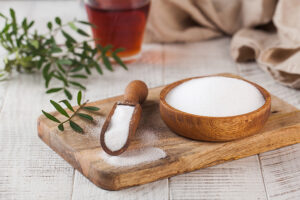A recent publication found that erythritol is linked to heart attacks and strokes. The study from the Cleveland Clinic was published Jan. 19, 2023 in Nature. It showed that people with diabetes had a 2-fold risk of getting a heart attack or stroke. Researchers measured the highest concentration of erythritol in their blood versus a control group with no erythritol in it. The study further showed that erythritol causes platelets to form clots, which could break of and travel to the heart or brain vessels. This triggered a heart attack or stroke. Dr. Stanley Hazen, director of the Center for Cardiovascular Diagnostics and Prevention at the Cleveland Clinic Lerner Research Institute said: “We never expected this. We weren’t even looking for it.”
Erythritol is what causes heart attacks and strokes
What the research team was looking for was “find unknown chemicals or compounds in a person’s blood that might predict their risk for a heart attack, stroke or death in the next three years. “This is how erythritol was identified as a risk factor.
Erythritol is a sugar alcohol
Like sorbitol or xylitol, erythritol is a sugar alcohol, which occurs in many fruits and vegetables. Erythritol has less laxative effect than some of the other sugar alcohols. It tastes like sugar and adds bulk to any stevia-based sweeteners. These are the reasons why it became the preferred zero calorie sweetener of the industry. Also, in a mixture it diluted the pronounced sweet effect of stevia, but added the crystalline texture appearance like sugar to the sweetener. This is what the consumer expected of a sweetener.
The clinical trials showing there is a link between erythritol and heart attacks as well as strokes
One group of patient’s tests were 1,157 blood samples from people at risk for heart disease collected between 2004 and 2011. Another batch of blood samples came from over 2,100 people in the United States and an additional batch from 833 samples gathered by colleagues in Europe through 2018. 75% of the participants in all three populations had coronary disease or high blood pressure, and about 20% had diabetes. Over 50% were male and in their 60’s and 70’s. All of those samples showed the following. Higher levels of erythritol showed a correlation to a greater risk of heart attack, stroke or death within three years.
Blood coagulation
Our blood has a delicate balance between coagulation from clotting factors and platelets on the one hand and fibrinolysis, which counters clotting, on the other hand. This ensures that we are not spontaneously bleeding and also not getting clots from hypercoagulation. The researchers found that it is this balance, which erythritol disturbs. Dr. Hazel said: “But what we’re seeing with erythritol is the platelets become super responsive: A mere 10% stimulant produces 90% to 100% of a clot formation”. This was the reason for the higher heart attack and stroke rates in the higher levels of erythritol in the blood.
Erythritol levels checked in healthy volunteers
The last part of the study involved tracking blood tests of erythritol in 8 healthy volunteers. They drank beverages containing 30 Grams of erythritol, which is the amount many Americans consume. According to the National Health and Nutrition Examination Survey, which examines American nutrition each year 30 Grams is the average daily consumption of Americans. The researchers took blood tests of erythritol for the next 3 days including tests of clotting risks. Dr. Hazen said: “Thirty grams was enough to make blood levels of erythritol go up a thousandfold. It remained elevated above the threshold necessary to trigger and heighten clotting risk for the following two to three days.”
Reaction of the industry
Robert Rankin, the Calorie Control Council’s executive director, an industry association, wrote in an email: “The results of this study are contrary to decades of scientific research showing reduced-calorie sweeteners like erythritol are safe, as evidenced by global regulatory permissions for their use in foods and beverages.” But this seems to be a lame excuse. The platelet clotting effect of erythritol simply was not what the FDA expected or tested for. The same was true for other regulatory bodies when they released it as safe. I have drawn my own conclusion and thrown out all sweeteners I had in my possession that contained erythritol.
Conclusion
Sometimes studies come out of the blue, which change our everyday practice. One of these studies is Dr. Stanley Hazen, director of the Center for Cardiovascular Diagnostics and Prevention at the Cleveland Clinic Lerner Research Institute. He showed that erythritol as an artificial sweetener is not harmless as previously thought of. This included the FDA as a regulatory agency, which labeled erythritol as GRAS (=generally recognized as safe). Now new evidence of clinical studies showed that erythritol is responsible for a twofold risk of heart attacks, strokes or death in the next three years. Dr. Hazen included all kinds of controls and also fed healthy volunteers erythritol. No matter how he looked at it, the risk remained.
Erythritol causes clots, which cause heart attacks and strokes
In animal experiments he could also show that erythritol caused platelets to stick together and cause clot formation. These clots could travel into the heart and brain vessels and cause heart attacks and strokes. For any consumer it is the most sensible approach to NOT use any sweetener that contains erythritol. This involves reading product ingredients before you buy any sweetener. Assuming that products are harmless, when the label reads “Stevia” is a fallacy! In numerous products the ingredient list will show the word “erythritol”. Buyer beware!






